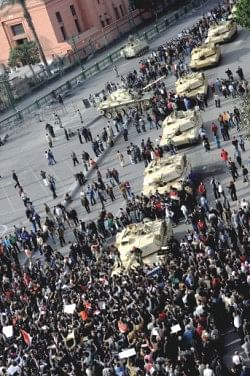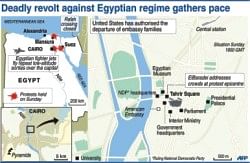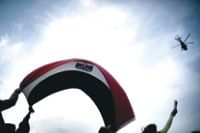Straight Talk
Tides of Change
NADIA KABIR BARB
In recent weeks all eyes have been turned to the Arab world, first with the political unrest in Tunisia and it's so called 'Jasmine Revolution' and the relatively peaceful overthrowing of its President Zine al-Abidine Ben Ali, followed closely on its heels by the crisis in Egypt. Protesters taking to the streets with the view to replicating the ousting of Tunisia's autocratic leader and bringing about a regime of change in Egypt after 30 years of Hosni Mubarak's reign. However, it all got a bit too close to home for us when my husband found himself stuck in Egypt during the protests.
 |
Ordinary Egyptians have taken to the streets of Cairo demanding the fall of Hosni Mubarak’s regime. |
Just over a week ago my husband came to me and told me he had some meetings in Cairo and wondered whether the children and I would like to join him for a few days afterwards. It has always been a desire of mine to see the pyramids of Giza, walk through the great Temple of Abu Simbel or visit the Valley of the Kings in Luxor but then again spontaneity has never been my strongest suit and much to the dismay and disappointment of my kids (who thought they might get to miss school to go on this holiday) I had to decline the tempting offer as it was far too short notice for me to organise the trip.
Almost from the day of his arrival we began to hear news of demonstrations taking place in Egypt. Most likely inspired by the success of the recent protests and toppling of its ruler in Tunisia the Egyptian people took to the streets of Cairo demanding the resignation of its long time leader Hosni Mubarak.
Up until Friday morning of last week I was able to stay in touch with my husband and for the first few days was reassured by his observations of relatively peaceful protests. But once Friday prayers were over, things seemed to take a turn for the worse and I watched with growing concerns the story unfolding on television and saw the clashes between protesters and the deeply unpopular police force. I read the reports of tear gas and water cannons being used to try and disperse the crowds of people and rubber bullets being fired at the protesters with many people being injured. Over the course of the weekend it emerged that over one hundred people had been killed during the riots.
On Friday afternoon I received a call from my husband telling me that there would be no internet connection and mobile signals were to be blocked as well and therefore it would be difficult to stay in touch. With no internet or mobile phone connection I had no contact with him for the rest of the day but from live news coverage, it appeared that the army had been deployed and a night time curfew imposed. Interestingly enough the Egyptian people do not view the army with the same disregard and hatred as they do the police and according to media reports people on the streets were greeting the army with cheering, some even clambering up onto the tanks as they rolled into the city. Although it is yet to be seen which side the army will place its loyalty – with the President or the people.
 Later in the evening my husband managed to call me from a landline and during our conversation he tried to describe to me what the view was like from his window. He said from the seclusion of his hotel room it was an almost surreal experience as he could see on one of the bridges two advancing lines of people. He assumed that the confrontation was between the protesters and the police force. There were plumes of white smoke billowing from the tear gas grenades fired intermittently into the advancing line. He was told that word on the street was that protesters were advised to carry two rags or pieces of cloth with them, one wet – to cover their mouths to avoid inhalation of the tear gas and another dry one to pick up the gas grenades and throw them back into the police. It was also suggested that they carry spray paints with them to spray the visors of the policemen. Later in the evening the view became somewhat dramatic where he had a view of a few buildings burning in the distance. All I can say is that knowing he was a few hundred yards from Tahrir Square where the protesters seemed to be converging was not a comforting thought. Later in the evening my husband managed to call me from a landline and during our conversation he tried to describe to me what the view was like from his window. He said from the seclusion of his hotel room it was an almost surreal experience as he could see on one of the bridges two advancing lines of people. He assumed that the confrontation was between the protesters and the police force. There were plumes of white smoke billowing from the tear gas grenades fired intermittently into the advancing line. He was told that word on the street was that protesters were advised to carry two rags or pieces of cloth with them, one wet – to cover their mouths to avoid inhalation of the tear gas and another dry one to pick up the gas grenades and throw them back into the police. It was also suggested that they carry spray paints with them to spray the visors of the policemen. Later in the evening the view became somewhat dramatic where he had a view of a few buildings burning in the distance. All I can say is that knowing he was a few hundred yards from Tahrir Square where the protesters seemed to be converging was not a comforting thought.
By the following day mobile connections were up and running so I managed to speak to him before he and his colleagues made their way to the airport and like many others found themselves stranded as most of the flights had been cancelled. With the curfew being brought forward to 4pm it was uncertain whether the various aircrafts would be able to take off or not that day. Eventually they managed to get on a flight heading to Vienna and subsequently get a connecting flight back to London.
 |
People in Egypt want Mubarak to go. Photo: AFP |
When he was safely back home, I asked my husband whether he had felt he was in danger at any point and it was surprising to hear that he had not. The only time he and his companions had felt slightly alarmed was on their drive back to the airport. This was mostly because they were aware of the fact that the driver appeared to be in an obvious state of anxiety. To compound to that he said that it was disturbing to drive past tanks situated across parts of the city, some in plain view others hidden under sheets, army officers patrolling the streets and passing through the remnants of the previous day's violence .
The new generation, whether in Tunisia, Egypt or more recently Yemen are no longer satisfied with sitting back and allowing themselves to be held hostage to decades of repression and loss of civil liberties. They have decided to take things into their own hands and step onto the streets demanding regime change and the rumblings of discontent within the Arab World have now snowballed into 'revolutions'. Maybe Hosni Mubarak should take the opportunity to step down like his counterpart in Tunisia while the situation is still contained.
Copyright
(R) thedailystar.net 2010 |
